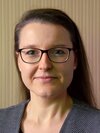Curriculum Vitae
Dr. rer. nat. Sandra Kaiser
Institution: University Freiburg - Medical Centre
Department of Anesthesiology and Critical Care
Research Group Prof. Dr. med. Schallner
Post-Doc (Biology)
Deputy project head and supervision
Telefon: 0761 270-72960
Email: sandra.kaiser@uniklinik-freiburg.de
Curriculum Vitae
Publikationen
2017-present
Postdoc in the lab of Prof. Dr. Nils Schallner, Department of Experimental Anesthesiology, University Freiburg Medical Centre
Deputy project head and supervision
Additions: laboratory equipment responsible, fire protection assistant
2012-2016
Doctoral research degree (PhD) study and project. Faculty of Biology and Medical Centre University Freiburg, Department molecular hematology, Laboratory Prof. Dr. Pahl: „The role of nuclear factor erythroid 2 (NF-E2) and its interaction partners in myeloid development and diseases“
Member of the Collaborative Research Center 992 (medical epigenetics) with Integrated Research Training Group (IRTG)
2006-2012
Study in Life Science Biology (Diploma)
Albert-Ludwigs-University Freiburg
- Major: molecular immunology
- Minor: cell biology, genetic und molecular biology
- Elective subject: pathology
- Laboratory internship 1: Center for Chronic Immunodeficiency; Freiburg
- Laboratory internship 2: Pathology University Freiburg Medical Centre
- Elective course: patent law for scientists, biostatistics
Scientific Work
Since 10/2020 Deputy project head (head: Prof. Dr. Schallner): Project funded by German Research Foundation (DFG) SCHA1838/4-2; HE 8145/4-2; Institution: University Freiburg Medical Centre; Department of experiemtal Anesthesiology
Characterizing the role of myeloid-specific heme oxygenase-1 (HO-1) in the regulation of circadian rhythms, neuroinflammation, and neuronal damage after traumatic brain injury
2020-2021 Covid project (head: Prof. Dr. Schallner) Institution: University Freiburg Medical Centre; Department of experiemtal Anesthesiology
Local and systemic markers of inflammation and circadian rhythm in COVID-19 disease - importance for the clinical-neurological outcome;
Since 01/2019 Deputy project head (head: Prof. Dr. Schallner): Project funded by German Research Foundation (DFG): SCHA1838/4-1; Institution: University Freiburg Medical Centre; Department of experiemtal Anesthesiology
The central importance of HO-1-dependent carbon monoxide production in the regulation of the circadian rhythm in the microglial context in subarachnoid hemorrhages (SAH)
01/2017 - 12/2018 Deputy project head (head: Prof. Dr. Schallner): Project funded by German Research Foundation (DFG): SCHA1838/3-1; Institution: University Freiburg Medical Centre; Department of experiemtal Anesthesiology
The importance of heme oxygenase 1 and carbon monoxide for erythrophagocytosis in the microglial context in subarachnoid hemorrhage (SAH)
2012-2016 Dissertation: Medical Centre University Freiburg, Department molecular hematology, Laboratory Prof. Dr. Pahl:
The role of nuclear factor erythroid 2 (NF-E2) and its interaction partners in myeloid development and diseases
- Contribution of NF-E2 truncation mutants to the development of myeloproliferative neoplasms (MPN) in vivo
- Assessment of methylation in NF-E2 and interaction with protein methyl transferases (PRMT)
- Assessment of the correlation of NF-E2 and Aurora Kinase A (in context of erythropoesis, mitosis and phosphorylation)
2012 Diploma project: Center for Chronic Immunodeficiency; University Freiburg Medical Centre Laboratory Prof. Dr. Hermann Eibel
"In vitro development of human B cells"
Teaching and Consulting
- Speaker in the lecture for medical university students: Successful doctoral studies - scientific and methodological fundamentals (Since 2019)
- Practical Course assistant: 1) molecular hematology for physicians 2) immunological methods
- Laboratory supervisor of medical doctoral students (planning, instruction, administration, analysis, scientific writing and revision)
- Laboratory training, support and consulting of researching physicians within the research group

